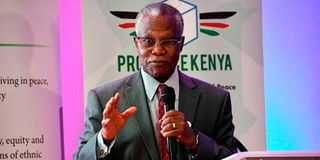NCIC ‘hotspots’: Draw a deliberate security plan to avert poll violence

National Cohesion and Integration Commission Chairman Samuel Kobia during a past event.
When she made her maiden campaign visit to Eldoret, in Uasin Gishu County, last Sunday, Azimio la Umoja One Kenya Coalition Party presidential running mate Martha Karua was upbeat, and so were the supporters. She opted to walk the three kilometres to the venue, Huruma grounds, through the town, making a few stops and with cheering supporters in tow.
That the Narc-Kenya leader and running mate of former Prime Minister and ODM chief Raila Odinga could mount a stirring and peaceful political rally without disruption is something to be exultant about.
This is not only the home county of the Kenya Kwanza Alliance flagbearer and UDA party leader, Deputy President William Ruto, but also his political stronghold. Dr Ruto is Mr Odinga’s strongest rival in the August 9 presidential election. Going by Kenya’s political history, it was such a relief that the Azimio team campaigned freely in the area.
That should, hopefully, be a pointer that Kenyans are maturing politically to the reality that disagreeing politically is not akin to enmity. It was a positive development that must be encouraged in the run-up to polling day. It is everyone’s desire and wish that the forthcoming elections will be democratic, free, fair and peaceful. That way, Kenya will return to normal life with a new government in place and without the distraction and disorder caused by electoral violence.
Violence “hot spots”
Last month, the National Cohesion and Integration Commission (NCIC) released a report detailing areas that they identified as possible violence “hot spots” ahead of the elections. Uasin Gishu, alongside Nakuru, Nairobi, Kericho, Mombasa and Kisumu, were flagged as counties with the highest risk of election-related violence. But even as all indications point to peaceful campaigns and, hopefully, voting, going by the current trend, residents of the hot spots are approaching the season with caution.
Taken precautionary measures
For instance, two weeks ago, on June 3, the Nation reported that traders in those counties have taken precautionary measures. Despite assurances by security agencies, the story noted, the traders have cut down on their businesses, including stock, to minimise loss in the event of electoral turmoil. But their fears are not far-fetched; they arise largely from past horrible events, particularly the horrifying 2007/2008 post-election violence.
The report, released on May 30, followed an NCIC survey conducted between January and April. In response, the Principal Secretary for Interior, Dr Karanja Kibicho, said there is no cause for alarm. While hate speech was a key parameter for the NCIC study, he explained, it would not automatically translate into politically driven violence.
But the need to put in place a clear, specific and deliberate security plan of action to safeguard the ordinary people at this point cannot be gainsaid. To inspire confidence, especially for women and families who have undergone untold suffering from politically instigated electoral violence, leaving them deeply traumatised and without access to justice, the plans must be made public.
For women’s rights organisations, sexual and gender-based violence (SGBV) has become an ugly and stubborn feature over the election years—including 2007, 2013 and 2017. Consequently, nothing short of radical and deliberate plans of action to mitigate violence in this year’s general election is needed. In past elections, violence was used as a power tool to intimidate vulnerable groups, particularly women. This included SGBV, destruction of property and displacement.
It should be a matter of concern that competing political parties are yet to be proactive in developing and sending out, publicly, key anti-violence messaging during this delicate season. While individual contestants are, at their pleasure, sending out messages on the need for peaceful election process, it will pay to have, specifically, the leading coalitions do so, and consistently. It is the right thing to do.
Ms Rugene is consulting editor and founder, The Woman’s Newsroom Foundation. [email protected].





